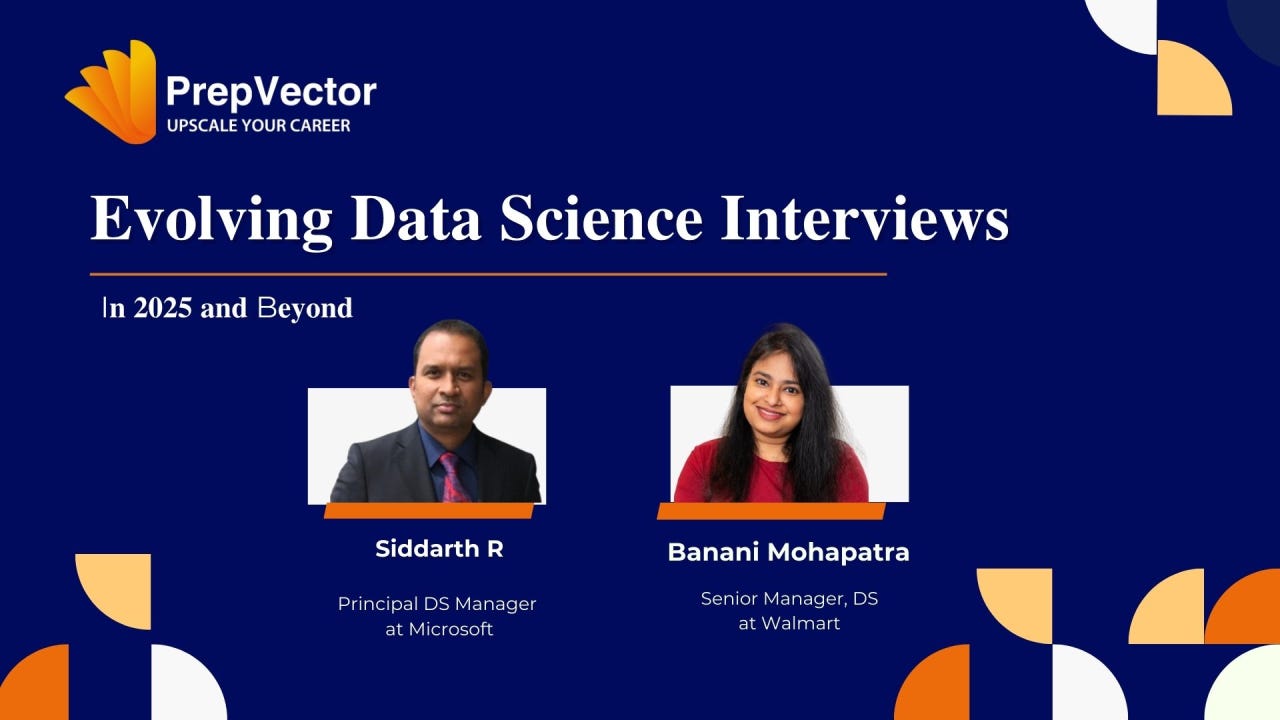The Future of Data Science Interviews: What You Need to Know for 2025 and Beyond
Discover how data science interviews are evolving in 2025. Prepare for the skills and formats that will define success.
Over the last decade, data science interviews have evolved dramatically. What started as case studies, SQL tests, and model-building questions has now transformed into multi-layered evaluations that test not just technical knowledge, but also product thinking, communication skills, and business acumen.
As we step into 2025, the hiring landscape is shifting again — influenced by AI automation, the increasing demand for end-to-end ownership, and companies’ need for data professionals who can drive business impact, not just build models.
So, what does this mean for aspiring and experienced data scientists?
👋 Hey! This is Manisha Arora from PrepVector. Welcome to the Tech Growth Series, a newsletter that aims to bridge the gap between academic knowledge and practical aspects of data science. My goal is to simplify complicated data concepts, share my perspectives on the latest trends, and share my learnings from building and leading data teams.
🔍 How Interviews Are Changing in 2025
Beyond Pure Technicals
While strong foundations in statistics, machine learning, and coding remain essential, companies are placing increasing emphasis on how candidates connect their technical solutions to business outcomes. Expect questions framed around ROI, experimentation trade-offs, and product-level thinking.Rise of Applied AI & Generative AI Case Studies
With GenAI moving mainstream, interviews are starting to explore your ability to apply LLMs, vector databases, and prompt engineering in real-world contexts. But more importantly, recruiters want to see your judgment on feasibility, risks, and ethics.Hybrid Assessments
Technical interviews are increasingly paired with scenario-based product interviews. A candidate may first build a predictive model and then be asked: “How would you explain this to a product manager? How would you track its success six months after deployment?”Communication & Stakeholder Management
The role of a data scientist has matured into that of a strategic partner. Interviewers are watching how you handle ambiguity, explain complex insights simply, and drive alignment with cross-functional teams.
What Recruiters Are Prioritizing
Product sense: Can you identify the right problem worth solving?
Experimentation mindset: Do you know when to run an A/B test vs. causal inference vs. observational analysis?
Systems thinking: Are you able to reason about scale, deployment, and model monitoring?
Career resilience: Do you demonstrate adaptability to fast-changing tools and frameworks?
In short, success in 2025 won’t come from being a “model builder” alone. It will come from being a holistic data professional — someone who balances technical expertise with storytelling, strategy, and collaboration.
Want to Go Deeper? Join Our Webinar
To unpack these shifts in detail, I’m thrilled to invite you to an engaging session:
🌟 Webinar: Evolving Data Science Interviews (in 2025 and Beyond)
🗓️ Date: September 19, 2024
🕐 Time: 1:00 PM EST
Featuring Expert Speakers:
Banani Mohapatra – Senior Manager, Data Science at Walmart
A seasoned data leader driving growth through subscription products, fraud prevention, and payments optimization.Siddarth R – Director of Data Science, Microsoft
With 20+ years of experience, Siddarth leads 25+ data scientists and engineers in Azure Capacity Planning, mentoring professionals worldwide.
What You’ll Learn:
How interview formats are evolving in 2025
The new balance between technical, product, and business skills
Key competencies recruiters are actively screening for
Practical strategies to stand out in a crowded job market
If you’re preparing for interviews in 2025, don’t just focus on LeetCode, Kaggle, or ML models. Build the muscle to translate data into business impact, navigate product trade-offs, and communicate with clarity. That’s what the next generation of hiring is all about.



